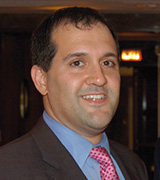International – or Bi-National – Religious Freedom?

Endy Zemenides
On December 4-5, the Archons are holding their second annual International Religious Freedom conference. Their first conference – in 2010 – caused quite a stir in the Greek-American community as they honored Egemen Bağış – Turkey’s Minister for EU Affairs. They could not have picked a more dishonorable awardee, as Bağış has spent the three years since receiving this award walking back promises on the opening of Halki, using vile rhetoric against Greece and Cyprus, and recently declaring that Turkey will not give back an “inch” of occupied Cyprus.
Last month, the Turkish government recently unveiled a “democratic reform” package, the latest step away from Kemalist rule and the 1982 constitution imposed by the Turkish military. This package was highly anticipated, as it was to address the rights of Turkey’s minority populations — particularly the Kurdish and Christian minorities. The Erdogan government, already honored by the Archons, extended itself and went out on a limb to show that it is not anti-Christian by returning an Assyrian Christian monastery in southeastern Turkey.
That Turkey is disingenuous on minority rights in general, and on restoring the full religious freedom of the Ecumenical Patriarchate specifically, should not be a surprise to anyone who has followed the situation carefully. Opening Halki should have been the easy concession for Erdogan. It came up constantly, he received public pressure from President Obama, and it would have immediate public relations impact – since it is ready for immediate operation. The only interest Erdogan and the AKP have in accommodating Christianity is the loosening of general restrictions on religious groups (so that the Islamic groups and foundations that make up their base have more freedom.) Erdogan is — in poker parlance — “slow playing” the Halki issue, trying to make it such a heavy lift that it will be nearly an impossible task to move on to the next step of full religious freedom for the Ecumenical Patriarchate.

From a visit of an Archons’ delegation to then AK Party Vice Chairman and currently Turkey’s Minister for EU Affairs Egemen Bagis (1st from right)
Are the Archons unwittingly falling for the “slow play”? They are obviously not obligated to make their strategy public – and they haven’t been – but what is public is not promising. Take the unconscionable demand linking a mosque in Athens to the opening of Halki. The mosque in Athens is going to happen, but it has NOTHING to do with Halki, or with any ethnic Turks that are part of Greece’s Muslim minority. Indeed, the subject of the religious freedom of the Ecumenical Patriarchate is not a bilateral issue of Greco-Turkish affairs. Any attempt to make it so (with not only talk of the mosque, but with the selection of the Muslim muftis in Greece — a subject that Turkey should have no opinion on since that official has judicial powers in Greece) is inconsistent with international law and is offensive. Yet some Archons – in public statements made in front of Greek government officials, on briefing calls with American think tank officials – have played along with this ruse of reciprocity. The upcoming conference is reinforcing this trend, as it features a plethora of Turkish presenters (http://conference. archons.org/speakers), including representatives of the Turkish state.
Engaging in this reciprocity ruse without giving the community any insight is counterproductive at best. The fact that so many of those engaging in the reciprocity discussion also claim extraordinary progress in the area of religious freedom but are generally absent from the day to day advocacy at policy making levels raises another red flag. Take the example out of the Metropolis of Chicago, where a controversial meeting with the Foreign Minister of Turkey in 2012 (http://www.greeknewsonline.com/ ?p=20878) was made worse by the efforts of Bishop Demetrios and certain Archons helping him to pass a religious freedom resolution in Illinois’ state legislature in 2013. To get around the objections of the Turkish Consulate General and the Gulen group that the Bishop has become close with, the resolution was watered down by including an amendment detailing the “progress” made on religious freedom during the Erdogan years (yet without noting that this “progress” has not extended the viability or religious freedom of the Ecumenical Patriarch). There was also an attempt to include an amendment praising the unsubstantiated “progress” in relations between Greeks and Turks in Illinois and abroad (thus inappropriately reducing the matter of the Ecumenical Patriarch to a bilateral Greco-Turkish affair). Fortunately, because of an immediate and substantial outcry by Illinois’ Greek-American community, that amendment was defeated. As statements on the floor of the Illinois Senate proved, even the sponsors recruited by the Bishop were not well acquainted with the nuances of the religious freedom issue (or the fact that it is not a bilateral issue between Greece and Turkey).
The Archons argue that their charge is international religious freedom, so it is appropriate for them to include an analysis of Western Thrace. So be it – although to claim that there is anything going on in Greece that is comparable to what Christianity is suffering in Turkey is so ridiculous, to call it a baseless lie is insufficient. But how about an examination of the treatment of Greek Orthodox Christianity in occupied Cyprus – which raises so many concerns that it was called out as a major religious freedom violation by the U.S. Commission on International Religious Freedom? That the Archons are well intentioned is unquestionable, but their strategy needs to be examined – or at least explained to the rest of the community.











0 comments